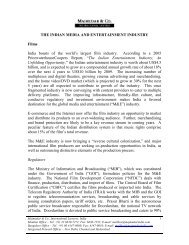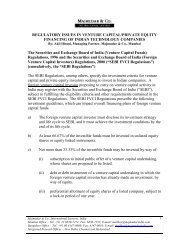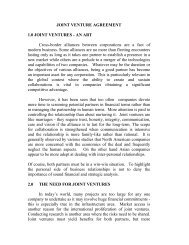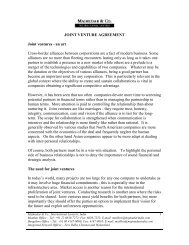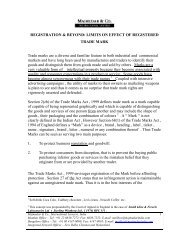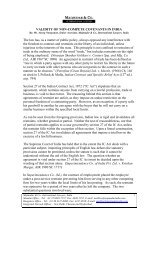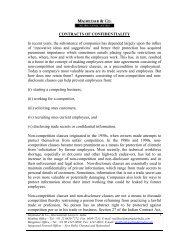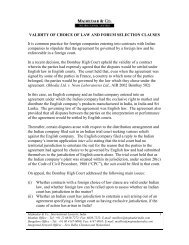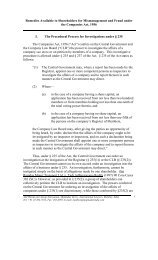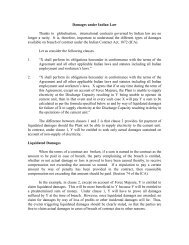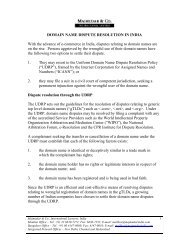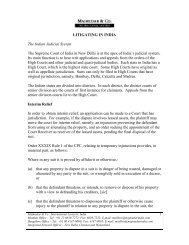Preference Shares in India.pdf - Majmudar & Co.
Preference Shares in India.pdf - Majmudar & Co.
Preference Shares in India.pdf - Majmudar & Co.
Create successful ePaper yourself
Turn your PDF publications into a flip-book with our unique Google optimized e-Paper software.
NUANCES RELATING TO PREFERENCE SHARES IN INDIA<br />
INTRODUCTION<br />
Under <strong>India</strong>’s <strong>Co</strong>mpanies Act, 1956 (the “Act”), share capital of a company<br />
is categorized <strong>in</strong>to preference and equity shares. <strong>Preference</strong> shares are that part of<br />
a company’s share capital which carry a preferential right to:<br />
• dividend at a fixed rate or amount; and<br />
• repayment of capital <strong>in</strong> case of w<strong>in</strong>d<strong>in</strong>g-up of the company.<br />
Share capital which is not preference share capital is regarded as equity<br />
share capital. (Section 85 of the Act). <strong>Preference</strong> shares convertible at a later date<br />
<strong>in</strong>to equity shares are known as convertible preference shares. <strong>Preference</strong> shares<br />
which do not carry any conversion option are known as non-convertible<br />
preference shares.<br />
PRIVATE COMPANIES AND PREFERENCE SHARES<br />
All the rights and limitations with regard to preference shares are applicable<br />
only to a public company or a private company which is a subsidiary of a public<br />
company. (Section 90 of the Act). This essentially means that a private company is<br />
free to create and issue any k<strong>in</strong>d of share capital and on any terms as it may deem<br />
fit. Therefore, a private company, through its articles of association, may create<br />
preference shares that carry the same or even extra rights as compared to equity<br />
shares.<br />
However, if a private company goes public, preference shares issued with<br />
higher rights will have to be redeemed or restructured to comply with the Act.<br />
Therefore, private equity transactions <strong>in</strong> <strong>India</strong>n public companies are commonly<br />
structured as equity <strong>in</strong>vestments with a small component of preference shares.<br />
This also applies to private companies, where the <strong>in</strong>vestor seeks an IPO exit.<br />
ADVANTAGES OF PREFERENCE SHARES<br />
As stated above, the ma<strong>in</strong> advantage of preference shares over equity shares<br />
is that they enjoy a preferential right to dividend and repayment of capital <strong>in</strong> case<br />
of w<strong>in</strong>d<strong>in</strong>g-up of the company.<br />
Another advantage is with regard to takeovers. Under the Securities and<br />
Exchange Board of <strong>India</strong> (Substantial Acquisitions of <strong>Shares</strong> and Takeovers)<br />
<strong>Majmudar</strong> & <strong>Co</strong>., International Lawyers, <strong>India</strong><br />
Tel: +91 22 6630-7272; Fax: 6630-7252; E-mail: mailbox@majmudar<strong>in</strong>dia.com<br />
1
Regulations, 1997 (the “Takeover Regulations”), a person who acquires 15% or<br />
more <strong>in</strong> a listed company’s equity share capital is required to make an open offer<br />
to acquire a further 20% equity shares from the shareholders of such company at a<br />
price calculated <strong>in</strong> accordance with the Takeover Regulations. (Regulation 10 of<br />
the Takeover Regulations). However, a person acquir<strong>in</strong>g preference shares need<br />
not comply with these regulations. (See the def<strong>in</strong>ition of “<strong>Shares</strong>” under<br />
Regulation 2(1)(k) of the Takeover Regulations).<br />
DISADVANTAGES OF PREFERENCE SHARES<br />
The ma<strong>in</strong> drawback of preference shares is that they carry limited vot<strong>in</strong>g<br />
rights. Generally, an equity share confers on its holder a right to vote on all<br />
resolutions that require shareholder approval under the Act, any other law, or the<br />
articles of association of the company. Equity shareholders, among others, enjoy<br />
the right to appo<strong>in</strong>t and remove directors and auditors, and approve the company’s<br />
accounts. Therefore, the control of a company is <strong>in</strong> the hands of its equity<br />
shareholders.<br />
As dist<strong>in</strong>guished from an equity share, a preference share carries vot<strong>in</strong>g<br />
rights only with respect to matters which directly affect the rights of the preference<br />
shareholders. In this regard, the Act clarifies a resolution relat<strong>in</strong>g to w<strong>in</strong>d<strong>in</strong>g-up<br />
and repayment or reduction of capital is deemed to directly affect the rights of the<br />
preference shareholders. (Section 87(2)(a) of the Act).<br />
Due to these limitations on vot<strong>in</strong>g rights, a preference shareholder does not<br />
have much control over the company. However, a preference shareholder may<br />
acquire vot<strong>in</strong>g rights on par with an equity shareholder if the dividend on<br />
preference shares is <strong>in</strong> arrears:<br />
(i) <strong>in</strong> case of cumulative preference shares, for an aggregate period of<br />
not less than two years on the date of the meet<strong>in</strong>g (cumulative preference shares<br />
are preference shares on which the unpaid dividend accumulates as arrears); and<br />
(ii)<br />
<strong>in</strong> case of non-cumulative preference shares:<br />
• for not less than two f<strong>in</strong>ancial years immediately preced<strong>in</strong>g<br />
the meet<strong>in</strong>g; or<br />
• for any three years, dur<strong>in</strong>g a period of six years end<strong>in</strong>g with<br />
the f<strong>in</strong>ancial year preced<strong>in</strong>g the meet<strong>in</strong>g. (Section 85(2)(b) of the Act).<br />
<strong>Majmudar</strong> & <strong>Co</strong>., International Lawyers, <strong>India</strong><br />
Tel: +91 22 6630-7272; Fax: 6630-7252; E-mail: mailbox@majmudar<strong>in</strong>dia.com<br />
2
The other drawback of preference shares is that they have to be redeemed<br />
with<strong>in</strong> twenty years from their issue. (Section 80(5A) of the Act).<br />
FOREIGN INVESTMENT AND PREFERENCE SHARES<br />
The Foreign Exchange Management (Transfer or Issue of Security by a<br />
Person Resident Outside <strong>India</strong>) Regulations, 2000 (the “Regulations”) prescribes<br />
limits on the ownership of an <strong>India</strong>n company’s shares by a foreign company<br />
depend<strong>in</strong>g on the sector. <strong>Preference</strong> shares are now <strong>in</strong>cluded <strong>in</strong> calculat<strong>in</strong>g such<br />
limits. Also, the rate of dividend payable to a foreign company on preference<br />
shares issued by an <strong>India</strong>n company cannot exceed 300 basis po<strong>in</strong>ts over the prime<br />
lend<strong>in</strong>g rate of the State Bank of <strong>India</strong> prevail<strong>in</strong>g as on the date of the board<br />
meet<strong>in</strong>g on which issue of preference shares was recommended. (Clause 7 of<br />
Schedule I of the Regulations).<br />
Further, <strong>in</strong> certa<strong>in</strong> sectors, the preference share route is not available to<br />
foreign <strong>in</strong>vestors at all. For <strong>in</strong>stance, the Insurance Act, 1938, prohibits life<br />
<strong>in</strong>surance companies from issu<strong>in</strong>g preference shares. Similarly, the Bank<strong>in</strong>g<br />
Regulation Act, 1949, prohibits banks from issu<strong>in</strong>g preference shares. However,<br />
the Bank<strong>in</strong>g Regulation (Amendment) Bill, 2005, proposes to permit banks to<br />
issue preference shares subject to the condition that preference shareholders will<br />
not acquire vot<strong>in</strong>g rights if the bank defaults <strong>in</strong> the payment of dividend.<br />
CONCLUSION<br />
<strong>Preference</strong> shares can be tailored to give control to an <strong>in</strong>vestor <strong>in</strong> a private<br />
company by contract and through the company’s articles of association. However,<br />
preference shareholders will not be able to control a public company or a private<br />
company that will be do<strong>in</strong>g an IPO. In the circumstances, deals <strong>in</strong> <strong>India</strong> <strong>in</strong>volve a<br />
significant equity component.<br />
<strong>Majmudar</strong> & <strong>Co</strong>., International Lawyers, <strong>India</strong><br />
Tel: +91 22 6630-7272; Fax: 6630-7252; E-mail: mailbox@majmudar<strong>in</strong>dia.com<br />
3



